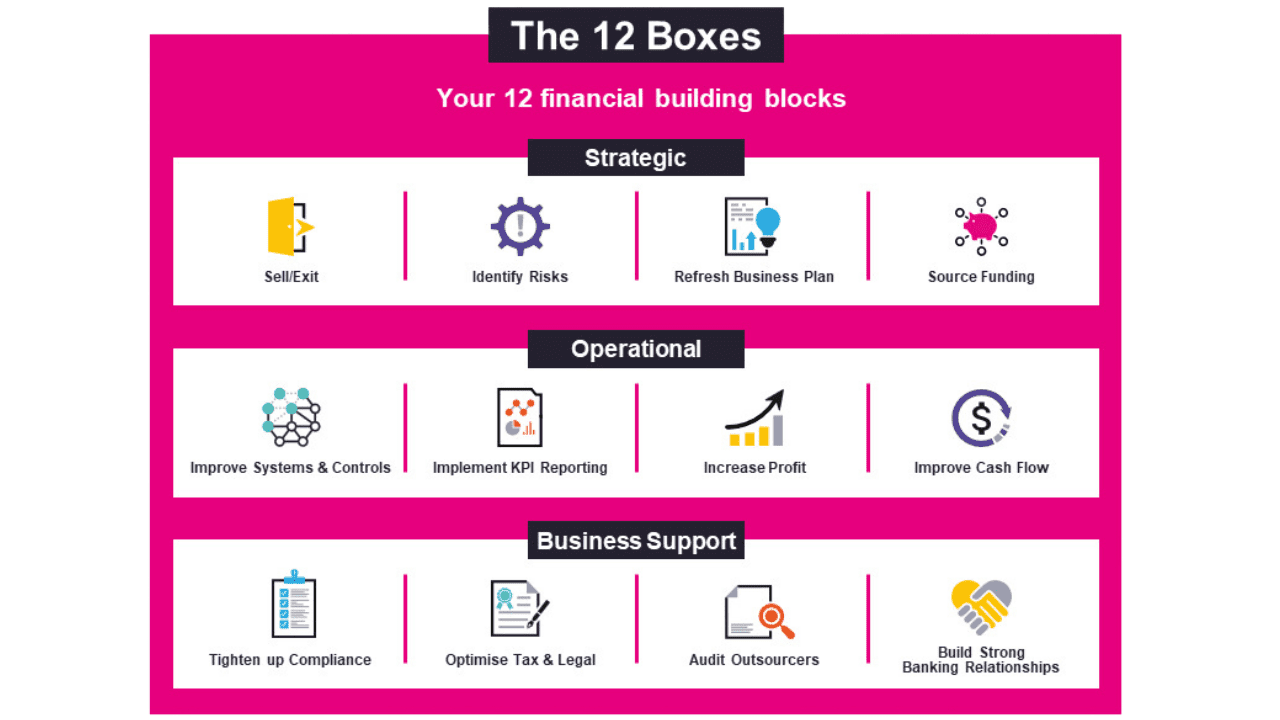
Succession planning and Exit planning is a very common topic we encounter as CFO’s when addressing a client’s top list of priorities.
In fact, some clients tend to list this as their number one priority to be achieved over the next two to five years.
Business owners spend years building their businesses, nurturing, and developing them. For the most part, the very reason they started the business was inspired by a passion or an idea. Usually around a certain product or service that they felt could not only be a commercial success, but one that would make a difference.
Common Scenarios
A common scenario we encounter as CFOs at The CFO Centre is a client up to their neck in meeting the day-to-day challenges of keeping the business “running smoothly” but just don’t have the time or wherewithal to putting mechanisms or strategies in place to set the business up for succession or exit.
In fact, we find the opposite. Business owners become so entwined in their business that they are involved in every aspect, which requires ongoing input and handholding. This makes it impossible to separate themselves from the business as a stand-alone entity which makes the business less attractive for a prospective purchaser.
Many business owners hope for that elusive buyer to walk through the door and put forward a nice big cash offer. The owner then dreams of sailing off into the sunset with a suitcase full of retirement cash.
This approach is mostly wishful thinking and very seldom becomes a reality. However, all is not lost as this is where our CFO Team at The CFO Centre can help.
I would like to mention a client we are working with currently, that approached The CFO Centre for support with selling 100% or a major share of his business which he had built-up over the past twenty years. The business is involved in manufacture in an industry that has a unique set of challenges and particular risk profile. So, the question was how do we propose an optimal exit solution?
Similar to a real estate agent advising a client on what to put in place when selling a house, we can apply here i.e. providing expert, objective, and non-emotional advice on how to position the business for sale.
Something worthwhile always needs time for planning, structuring, and executing. Therefore, the sale of a business or building a succession plan, requires deep experience and investing time. Furthermore, this process often takes several years to complete. It’s certainly not a quick fix. Like a health check we need to implement the fundamentals that make a business successful, viable and competitive. Using our twelve building blocks model we would help create the right platform to enable you to ‘own’ rather than ‘run’ your business.
A more in-depth discussion can be had around our 12-box program but in essence they are:

The 12 boxes
Ideally, we address the operational issues first and foremost at the outset of our engagement in conjunction with the 4 boxes focused on Business Support. Implementing the 4 fundamental operational boxes sets up a healthy platform for the business making it all that more appealing to a prospective buyer.
We are then able to transition into more of a Strategic role. Becoming more of a sounding board for key decisions, bringing objectivity, experience and wisdom to the table. This is especially helpful in family businesses whereby that non-biased voice of reason becomes critical when making strategic decisions.
At The CFO Centre, we have an extensive network of affiliated partners. This includes business brokers, tax accountants, legal practitioners etc. These partners help with providing key support in critical non-core areas of the business per the business support matrix (above), together with our extensive network of CFO’s and their clients. Such a large, connected ecosystem is helpful when trying to attract interested parties for a business sale.
There are other exit options for a business owner, as opposed to selling equity.
The most obvious being succession planning and management buy-out. Typically a group of managers/ leaders within the organisation could potentially take over from you as the owner. This approach does require years of planning and preparation however. Ideally one recruits or selects someone within the organisation that shows appropriate leadership potential. Normally, this person would come with an entrenched set of skills. One then needs to embark on a program of broadening these skills, encompassing a good grounding in all key functional disciplines – sales, marketing, finance and operations.
It is then critical to tie the earmarked leader(s) reward and remuneration package to the performance goals and valuation of the business. When these are met, the individual concerned is rewarded – ideally through equity participation. A colleague I know joined a Music business back in 1996 as Finance Manager and ultimately took over the CEO role from the Founder in 2003. As you can see this took several years of learning, development and slowly handing over the reigns. When the CEO passed away unexpectedly in 2006, all the necessary steps had been taken to ensure that the company would be in safe hands and future proofed. My colleague continued to successfully lead the company as CEO and later sold the business at an optimal value to a private equity firm.
The Moral?
The moral of this story – 10 years. It took 10 years to develop and execute the succession plan and Exit. By applying our 12 financial building boxes we can play a key role as your part time CFO. Assisting in the execution of your succession and exit plan. The key in this process however is that it is certainly not a quick fix and can take years to implement and achieve the appropriate value.
Reach out to us to chat more about this, with one of our top-notch CFOs or complete our Scale Up and Exit Business Assessment to understand if you are ready to scale up and have a successful exit.
Hire a superstar part-time CFO
To help you increase cash, profit and valuation and free you up from the burden of day-to-day operations.
